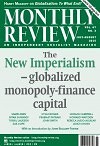Bolivia

May’s Review of the Month, “Honor the Vietnamese, Not Those Who Killed Them” by MR Associate Editor Michael D. Yates, has elicited many responses. One writer said that Yates had written the best, but perhaps the first, Marxist analysis of the war. Another praised Monthly Review for having the courage to publish this article. Still a third predicted that in the more distant future, humanity would embrace the essay’s judgment and honor the Vietnamese people for their heroic struggle against the overwhelming might of the U.S. military.… In light of these comments, as well as the subject matter of this double issue of Monthly Review on imperialism, we thought it might be worthwhile to say something more about what the Vietnamese themselves naturally enough call the American War, with an eye toward drawing important lessons useful for contemporary radicals. | more…
Medicine and public health have played important roles in imperialism. With the emergence of the United States as an imperial power in the early twentieth century, interlinkages between imperialism, public health, and health institutions were forged through several key mediating institutions. Philanthropic organizations sought to use public health initiatives to address several challenges faced by expanding capitalist enterprises: labor productivity, safety for investors and managers, and the costs of care. From modest origins, international financial institutions and trade agreements eventually morphed into a massive structure of trade rules that have exerted profound effects on public health and health services worldwide. International health organizations have collaborated with corporate interests to protect commerce and trade. In this article we clarify the connections among these mediating institutions and imperialism. | more…
Although medicine and public health have played important roles in the growth and maintenance of the capitalist system, conditions during the twenty-first century have changed to such an extent that a vision of a world without an imperial order has become part of an imaginable future. Throughout the world, diverse struggles against the logic of capital and privatization illustrate the challenges of popular mobilization. In addition to these struggles, groups in several countries have moved to create alternative models of public health and health services. These efforts—especially in Latin America—have moved beyond the historical patterns fostered by capitalism and imperialism…. All the struggles that we describe remain in a process of dialectic change and have continued to transform toward more favorable or less favorable conditions. However, the accounts show a common resistance to the logic of capital and a common goal of public health systems grounded in solidarity, not profitability. | more…
An Integral Component and Driving Force of Imperialism in the Phase of Monopoly-Finance Capitalism
According to Michał Kalecki, the imperialist system of the Keynesian era rested on a triangular structure that was composed of (a) state-financed military production (i.e., the military-corporate complex, often called the “military-industrial complex”), (b) media propaganda (media-corporate complex), and (c) a putative full-employment/welfare-oriented superstructure (Keynesianism) underpinned by the war machine, serving to justify it. Building on Kalecki’s work, John Bellamy Foster, Hannah Holleman, and Robert W. McChesney provided an updated version of the theory of imperialism of the monopoly-capital tradition by laying emphasis on the primary role of the above triangle in the restructuring and preservation of the contemporary imperialist system.. Expanding on their work, I argue that one of the most significant changes in the triangular structure of contemporary imperialism is in its third pillar, particularly with the abandonment of the welfare-oriented paradigm and the adoption of the neoliberal globalization project. | more…
After five hundred years of domination and colonialism, more than fifty years since the introduction of universal suffrage, and following five years of intense social struggle, the indigenous majority of Bolivia, for the first time in December 2005, elected one of their own as president — the coca grower leader and head of the Movement Toward Socialism (MAS) Evo Morales. The victory — winning more than 50 percent of the vote — was more than an indication of the rejection of twenty years of neoliberal rule. Peruvian activist Hugo Blanco summed up the significance of this event when he wrote, “the new president is not the result of a simple ‘democratic election’ like the many that frequently occur in our countries, it is an important step in the path of the organized Bolivian people in their struggle to take power into their own hands.” | more…
The victory of Evo Morales, presidential candidate of the Movement Toward Socialism (MAS), in Bolivia’s December elections was a world-historical event of the first order. Its extent was unexpected, certainly by us. Morales won well over 50 percent of the vote. He vanquished his closest rival, former president Jorge Quiroga (the favorite of international capital) by a margin of more than 20 percentage points. Morales openly opposes neoliberalism and U.S. coca eradication policies, insists on national control of Bolivia’s natural gas and other natural resources, and promises to aid those at the bottom of the society. Bolivia is currently the poorest nation in South America, but it has the second largest natural gas reserves on the continent | more…
La Paz, the Bolivian capital, rests in a deep valley in the heart of the Andes. The geographical terrain of the city is marked clearly with deep class divisions and the racist legacies of Spanish colonial impositions and ongoing internal colonialism, present since the founding of the republic in 1825. The indigenous peoples-over 60 percent of the population according to the 2001 census-have suffered at the bottom of a wickedly steep social hierarchy that whitens in accordance with class privilege | more…
